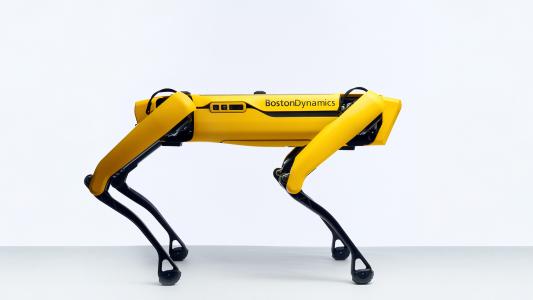A team of researchers want to build robots out of ice and send them to space. The idea is that — lacking a local repair shop — the icy bots can use found materials to rebuild themselves.
Ice can be located all over the solar system, from the moon to the distant rings around Saturn. So researchers from the University of Pennsylvania are trying to figure out how to tap into that nearly unlimited resource for robotics.
NASA wants to send the robot dog, Spot, to space. The canine-bot can do many tricks — from herding sheep to helping the NYPD in a hostage situation — but it likely won’t be able to repair itself. Where could it find enough materials to do the job?
Introducing IceBot, a concept robot that could be the future of robotic space exploration — although the team says they’ve only just begun. The work is still very preliminary, reports IEEE Spectrum, however, their goal is to design a robot that can exhibit “self-reconfiguration, self-replication, and self-repair.”
In a paper presented at the IEEE/RSJ International Conference on Intelligent Robots and Systems (IROS) the team outlined several ways to create the bots out of ice, using additive and subtractive manufacturing processes.
Their first robot, a proof-of-concept Antarctic exploration robot, weighed 6.3 kilos, could roll up a 2.5-degree incline, and turn side to side. One caveat: they included regular batteries and actuators in their plans. But the bulk of the robot, and its structural parts and wheels were all built out of ice.
Devin Carroll told IEEE Spectrum that he and his co-author Mark Yim wanted to build the robots from found materials “as a way to add robustness to robotic systems operating in remote or hostile environments.”
“We ultimately settled on ice because of the design flexibility it affords us and the current interest in icy, remote environments. Climate change has many folks interested in the Antarctic and ice sheets while NASA and other space exploration groups are looking to the stars for ice and water,” he said.
Carroll sees the ice robots working in teams, where an explorer bot collects materials and the other bot acts as the mechanic.
“We can envision the exploration class of robot returning to a centralized location with a request for a plow or some other augmentation and the manufacturing system will be able to attach the augmentation directly to the robot,” he said, adding that one of the biggest challenges is minimizing the amount of energy required to repair the robots.
There is still a lot of work to do before IceBot is space-ready. But this proof-of-concept robot is the first step in demonstrating that a robot made of ice could perform different tasks. For now, there are other exciting space feats to look forward to this year.
We’d love to hear from you! If you have a comment about this article or if you have a tip for a future Freethink story, please email us at tips@freethink.com.
